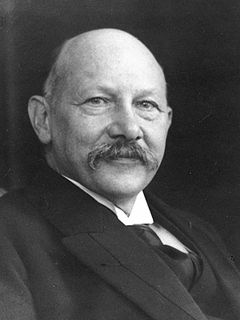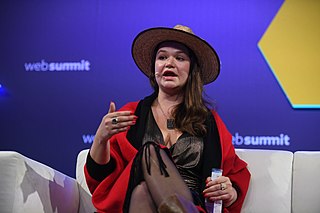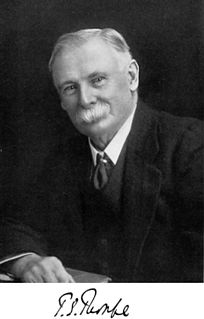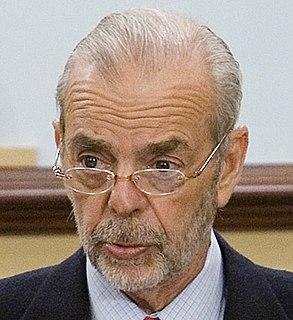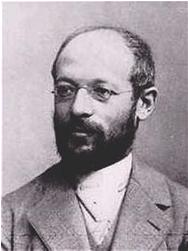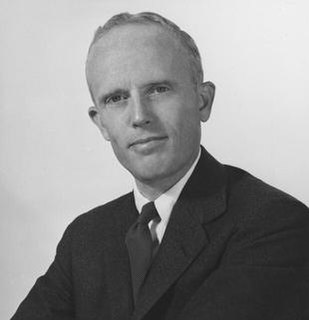Top 98 Quantitative Quotes & Sayings - Page 2
Explore popular Quantitative quotes.
Last updated on April 17, 2025.
We forget that, although each of the liberties which have been won must be defended with utmost vigour, the problem of freedom is not only a quantitative one, but a qualitative one; that we not only have to preserve and increase the traditional freedom, but that we have to gain a new kind of freedom, one which enables us to realize our own individual self; to have faith in this self and in life.
The foundations of population genetics were laid chiefly by mathematical deduction from basic premises contained in the works of Mendel and Morgan and their followers. Haldane, Wright, and Fisher are the pioneers of population genetics whose main research equipment was paper and ink rather than microscopes, experimental fields, Drosophila bottles, or mouse cages. Theirs is theoretical biology at its best, and it has provided a guiding light for rigorous quantitative experimentation and observation.
This is true even in organizations that are very focused on analysis and quantitative measurement, even among people who think of themselves as smart in an MBA sense. In highly successful change efforts, people find ways to help others see the problems or solutions in ways that influence emotions, not just thought.
According to my views, aiming at quantitative investigations, that is at establishing relations between measurements of phenomena, should take first place in the experimental practice of physics. By measurement to knowledge [door meten tot weten] I should like to write as a motto above the entrance to every physics laboratory.
Since 2008 you've had the largest bond market rally in history, as the Federal Reserve flooded the economy with quantitative easing to drive down interest rates. Driving down the interest rates creates a boom in the stock market, and also the real estate market. The resulting capital gains not treated as income.
The United States says "We're complying. We're following the disarmament obligation. Look at the quantitative reductions that are taking place." But, since '96, there really hasn't been progress on specific commitments that have been made. Perhaps most disturbing is this: that the United States and France in particular, since 1996, have expanded the range of circumstances under which they might use - they say they might use - nuclear weapons.
The physiological combustion theory takes as its starting point the fundamental principle that the amount of heat that arises from the combustion of a given substance is an invariable quantity-i.e., one independent of the circumstances accompanying the combustion-from which it is more specifically concluded that the chemical effect of the combustible materials undergoes no quantitative change even as a result of the vital process, or that the living organism, with all its mysteries and marvels, is not capable of generating heat out of nothing.
Quantitative work shows clearly that natural selection is a reality, and that, among other things, it selects Mendelian genes, which are known to be distributed at random through wild populations, and to follow the laws of chance in their distribution to offspring. In other words, they are an agency producing variation of the kind which Darwin postulated as the raw material on which selection acts.
The reason we have so much talent in Silicon Valley building and investing in for-profit technology companies is that markets richly reward successful ideas, no matter who invents them. But to remain competitive in a free market, companies must exercise discipline to meet quantitative goals and eventually become cashflow positive.
In order to create predictive algorithms, you need to have a training set. So, that training set is created through our quantitative surveys. Those surveys need to include either basic market research questions or basic political polling questions, which might be added to get your opinion on a brand or an issue or a candidate.
The four most dangerous words in finance are 'this time is different.' Thanks to this masterpiece by Carmen Reinhart at the University of Maryland and Kenneth Rogoff of Harvard, no one can doubt this again. . . . The authors have put an immense amount of work into collecting the data financial institutions needed if they were to have any chance of making quantitative risk management work.
The first step is to measure whatever can easily be measured. This is OK as far as it goes. The second step is to disregard that which can't be easily measured or to give it an arbitrary quantitative value. This is artificial and misleading. The third step is to presume that what can't be measured easily really isn't important. This is blindness. The fourth step is to say that what can't be easily measured really doesn't exist. This is suicide.
Machines have given us a new ability to count and make our understanding quantitative. The Web connects news gatherers with audiences in ways that were never possible before and can bring a breadth of intelligence, and experiences to understanding the news we never had. And professional reporters and editors still have a unique role to play in triangulating those inputs as well as bringing three other distinct skills - access to interrogate people in power, exceptional storytelling skills, and a discipline of open minded, skeptical inquiry - which are not as likely to be found elsewhere.
One of the great unresolved psychological enigmas of the modern western world is the question of what or who has persuaded us to accept as virtually axiomatic a self-view and a world-view that demand we reject out of hand the wisdom and vision of our major philosophers and poets in order to imprison our thought and our very selves in the materialist, mechanical and dogmatic torture-chamber devised by purely quantitative and third-rate scientific minds.
To us ... the only acceptable point of view appears to be the one that recognizes both sides of reality-the quantitative and the qualitative, the physical and the psychical-as compatible with each other, and can embrace them simultaneously ... It would be most satisfactory of all if physis and psyche (i.e., matter and mind) could be seen as complementary aspects of the same reality.
Not enough of our society is trained how to understand and interpret quantitative information. This activity is a centerpiece of science literacy to which we should all strive-the future health, wealth, and security of our democracy depend on it. Until that is achieved, we are at risk of making under-informed decisions that affect ourselves, our communities, our country, and even the world.
Those who are guilty of the argumentum ad ignorantiam profess belief in something because its opposite cannot be proved ... In the realm where "prejudice" is now most an issue, it normally takes a form like this: you cannot prove by the method of statistics and quantitative measurement that men are not equal. Therefore all men are equal. ... You cannot prove again by the methods of science that one culture is higher than another. Therefore the culture of the Digger Indians is just a good as that of Muncie, Indiana, or thirteenth-century France.
Man is more than his environment. It is from the innate quality of the Spirit in him, his inner storehouse, that he draws those ideas, his intuitions, which unify his perceptions of the external world instantaneously with a value which is qualitative and not quantitative, and which he embodies in the works of his culture - those achievements which belong not only to one particular time but to all times, and mark the path of his upward progress.
[Henry Cavendish] fixed the weight of the earth; he established the proportions of the constituents of the air; he occupied himself with the quantitative study of the laws of heat; and lastly, he demonstrated the nature of water and determined its volumetric composition. Earth, air, fire, and water-each and all came within the range of his observations.
The state sometimes makes mistakes. When one of these mistakes occurs, one notes a decline in collective enthusiasm due to the effect of a quantitative diminution in each of the elements that make up the mass. Work is paralyzed until it is reduced to an insignificant level. It is time to make a correction.
the leader releases energy, unites energies, and all with the object not only of carrying out a purpose, but of creating further and larger purposes. And I do not mean here by larger purposes mergers or more branches; I speak of larger in the qualitative rather than the quantitative sense. I mean purposes which will include more of those fundamental values for which most of us agree we are really living.
The United States has given frequent and enthusiastic support to the overthrow of democracy in favor of "investor friendly" regimes. The World Bank, IMF, and private banks have consistently lavished huge sums on terror regimes, following their displacement of democratic governments, and a number of quantitative studies have shown a systematic positive relationship between U.S. and IMF / World Bank aid to countries and their violations of human rights.
We need quantitative assessments of the success of education. We need certification and qualifications both for teachers and for pupils. It is not a choice between quantity and quality, between access and excellence. Both of these will happen together if people really do believe in the importance of education to change lives.
Speed is one of the great curses of modern civilization, obsession with speed leads to quantitative approach; we come to believe that more is better. This is very materialistic, we have to realize that it is the quality of life, quality of relationships, quality of food, medicine, education and everything else which matters.
The Fed contributed to the financial crisis, keeping interest rates too low for too long. I give them credit for responding and stabilizing the economy and the financial sector during the crisis. But then they tried to do too much with quantitative easing that went on forever, just dramatically exploding their balance sheets.
I think polling is the best way of gauging public opinion - doing something that's independent, that's quantitative, that doesn't give just the loud voices about how things are going; or doesn't give so called experts the notion that they know what public opinion is. I think that's what makes public opinion polling pretty important. Qualitative assessments of public opinion; going out and talking to people and understanding the nuance to what's behind the numbers. I think it's awfully important as well.
I think polling is important because it gives a voice to the people. It gives a quantitative, independent assessment of what the public feels as opposed to what experts or pundits think the public feels. So often it provides a quick corrective on what's thought to be the conventional wisdom about public opinion. There are any number of examples that I could give you about how wrong the experts are here in Washington, in New York and elsewhere about public opinion that are revealed by public opinion polls.
The calculative exactness of practical life which the money economy has brought about corresponds to the ideal of natural science: to transform the world by mathematical formulas. Only money economy has filled the days of so many people with weighing, calculating, with numerical determinations, with a reduction of qualitative values to quantitative ones.
With each passing year the difficulty of meeting any fixed quantitative target increases progressively. Moreover, plausible estimates of when the Protocol would go into effect leave such a small window of time before the first commitment period that achievement of the Kyoto targets will eventually pass out of reach.
Reality, in its quantitative aspect, must be considered as a system of populations... The general study of the equilibria and dynamics of populations seems to have no name; but as it has probably reached its highest development in the biological study known as 'ecology,' this name may well be given to it.
The business schools could do a better job teaching face-to-face management, the actual work of organizing and helping along the efforts of others in the organization. The more quantitative disciplines have gotten more attention, often more research dollars. Areas like organizational science or, even mushier, leadership have had more trouble settling on what it's important to teach, and how. It's rather like strategy itself, which as I argue in the book, has had trouble through most of its history figuring out how to incorporate people, their motivation and ability, into its calculations.
Almost all the greatest discoveries in astronomy have resulted from what we have elsewhere termed Residual Phenomena, of a qualitative or numerical kind, of such portions of the numerical or quantitative results of observation as remain outstanding and unaccounted for, after subducting and allowing for all that would result from the strict application of known principles.
In [Aristotle's] formal logic, thought is organized in a manner very different from that of the Platonic dialogue. In this formal logic, thought is indifferent toward its objects. Whether they are mental or physical, whether they pertain to society or to nature, they become subject to the same general laws of organization, calculation, and conclusion - but they do so as fungible signs or symbols, in abstraction from their particular "substance." This general quality (quantitative quality) is the precondition of law and order - in logic as well as in society - the price of universal control.



